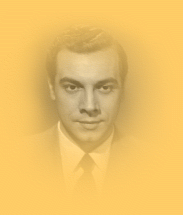
Confounding the Enemy

by Derek McGovern
Performing in front of an audience can be an ordeal for any artist. It is said that Enrico Caruso approached many a performance praying the earth would swallow him up, such was his terror of failing in public. "I would not wish this fear on my worst enemy," he was often quoted as saying. Caruso was by no means alone. Many years later, the esteemed Franco Corelli would - in the words of one colleague - suffer "the torments of the damned" before each public performance, and at times such crippling stage fright would simply overwhelm him.
But it's probably fair to say that neither Caruso nor Corelli ever experienced the kind of fear that must have assailed Mario Lanza as the night of October 28, 1954 and his second Shower of Stars television performance approached. Lambasted by a self-righteous press for lip-synching on the show the previous month, the knives were already being sharpened for his second appearance, and Lanza knew that no mercy would be shown if he failed to sing live this time.
It was not as if he hadn't already suffered enough. In the previous two years he had endured the cancellation of both The Student Prince and his MGM contract; a crippling injunction that had temporarily prevented him from performing; near-bankruptcy, and a lien imposed against his recording royalties by the IRS; and on top of it all an unrelenting press campaign painting him as a temperamental egotist who had lost his once-great voice. It is difficult to imagine a more terrifying scenario for any artist, let alone a person as sensitive as Lanza undoubtedly was.
It probably mattered little to the press that Mario had already proved he could still sing. Earlier that month he had summoned a group of journalists to his home and performed an impromptu recital that stunned all those present. But typically, the event had gone largely unreported. This was hardly surprising at a time when many journalists were openly hostile toward Lanza. After all, why let the facts get in the way of a good story? Far better to concentrate on a "misdeed" than a triumph, and the tenor's troubles - both real and imagined - had already provided the press with plenty of rich pickings. Time Magazine, for example, would later crow that Lanza's voice was "already showing tarnish" by 1954, and few journalists would have bothered to dispute the widespread view that Mario's career was essentially over. The man had it coming to him, in any event, or so the stories insinuated. Who did he think he was, refusing to give press interviews and acknowledging that he possessed a great voice? Clearly, this man needed cutting down to size, and who better to wield the axe than those self-appointed arbiters of public opinion - the tabloid press? Having already portrayed Lanza as an over-emoting, gluttonous has-been, their work was nearly done. Only one last damning report remained to be penned: Lanza's final humiliation as he disgraced himself in front of millions of viewers. His demise seemed deliciously inevitable, and indeed the vultures were already circling.
But heroes, no matter how fallen their detractors may paint them, will often confound the enemy, and Mario was no exception. Determined to silence his critics, and - more importantly - regain his self-respect, he had enlisted the help of his friend and occasional vocal coach, the great Giacomo Spadoni. Under the latter's guidance, Mario's confidence slowly began to return, and as October 28 approached Spadoni had good reason to believe that the tenor would be in fine form on the night. "God has put into this boy everything that is required of a great singer," he had remarked six years earlier, and Spadoni saw no reason now to change that assessment.
Together they had selected two numbers that would showcase Mario at his very best: the dramatic E Lucevan le Stelle from Tosca, and the romantic Some Day from The Vagabond King. As October 28 arrived, an afternoon rehearsal of the latter had gone splendidly, with Lanza producing some gloriously honeyed tones. Now it remained for the tenor to steel his nerves for the evening that lay ahead. Would he really be able to pull off his first live appearance in front of an audience in over three years? The odds seemed clearly against him, but then again, Lanza was no ordinary mortal.
And now the moment had arrived.
Overweight and dressed in an outlandish oversized collar, Lanza nevertheless looks every inch the operatic tenor as he appears from behind the curtains and strides onto the CBS stage. Visibly nervous, he looks briefly around while he seeks to maintain his composure. Then an oboe signals the haunting introduction to E Lucevan le Stelle, and he fleetingly closes his eyes, losing himself in the beautiful music as he literally becomes the doomed hero that Puccini envisioned. His complete involvement in the aria now assured, he begins to sing.
"E lucevan le stelle, ed olezzava la terra…" Nervousness is still evident, but one thing is clear: the voice is intact. There is, however, a small technical problem. Perhaps fearing a further scandal, the producers have erred on the side of caution in terms of microphone placement, with the balance between singer and orchestra clearly in the latter's favour. Certainly Lanza's voice sounds pushed back and foggily recorded. On the plus side, Mario's delicate phrasing is immediately apparent. He smiles to himself as he sings "Mi cadea fra le braccia," recalling the memory of his lover's embrace, and shaping the exquisite words with his hands. When he gets to "disciogliea dai veli," he comes into his own with such ringing splendour that the reverberation around the auditorium must have startled the assembled journalists into snapping their pencils.
By now totally in control, Lanza takes things up a notch dramatically, pouring everything he has into the aria. One senses a man oblivious to everything around him as he emphatically repeats the line "E muoio disperato!" It is the cry of a man who has lost everything, and this is truly singing from the soul. Moments later he sings the climactic line: "E non ho amato mai tanto la vita," closing his eyes on the sustained high A on "amato" as the emotion of the moment temporarily transports him to another world. A near-hysterical "la vita!" ends the rendition, and Mario gulps with a mixture of relief and exhaustion, seemingly drained from the sheer drama of the moment. The audience erupts with wild applause, and Lanza - still dazed from the experience - acknowledges the cheering in an uncharacteristically subdued manner.
"Thank you, ladies and gentlemen," he tells them, somewhat breathlessly. "And now, in answer to all the wonderful letters you sent me since the first Chrysler Show, may I sing for you the one that you requested most - Some Day from The Vagabond King."
Although fans must have scratched their heads over this supposed "request" - Some Day, after all, had not yet been released on any Lanza album - it proves to be an inspired choice for the tenor. Alternately sweet and heroic, it had been one of the highlights of Mario's Coca-Cola radio show three years earlier, and here Lanza's commitment to the song is as compelling as ever. "Some day, you will seek me and find me," he sings at the outset, filling the auditorium with his dulcet liquid tone. Clearly more relaxed now he savours every word, with Spadoni's slow tempi highlighting his sensitive phrasing and impressive breath control.
The rendition is a masterly display of Mario's soft and loud pedals. "Some day, when the winter is over," he sings caressingly at one point, forming the words with magical delicacy. Moments later he is thrillingly exultant ("…of a dream that is CALLING for you and for me"), switching pedals seamlessly, and to disarming effect.
Uncomfortable only when the off-stage chorus takes over - and he is awkwardly marooned with nothing to do - the impact of his performance is a marvel of dazzling vocalism and irresistible stage presence. Supremely confident in the second half of Some Day, he stands there, arms outstretched, building the song to a devastating climax that is reminiscent of his on-screen delivery of Torna a Surriento in the movie Serenade. (He even looks similar here.) His approach is fearless, with a blithe lack of concern for the sustained high A on which he must conclude the song. Where other singers would have betrayed their fear of the difficult note that is coming, Lanza appears to relish the challenge. "My soul shall discover the soul born for her lover," he sings with great feeling - again utilizing both soft and loud pedals - and then the climax: "the man with the heart of a KING!"
And the king indeed of tenors Lanza reveals himself to be here. Gratefully acknowledging the terrific applause - and not quite believing that the brief concert is over - he welcomes Spadoni onto the stage, clinging to his friend's hand as the latter tries to depart. It's a touching gesture of love toward the man who had helped make the event possible, and not the only time that Spadoni would come to the rescue with his support and musical expertise. My only regret is the sheer brevity of this concert. With Lanza in such fine vocal fettle, he could have sung anything that night, and the mouth waters when one imagines the likes of Che Gelida Manina (which Mario had sung for the press that month) also being on the programme.
Lanza would sing live on television on two subsequent occasions, one of which has been preserved on film. Considering the fact that Lanza gave over 150 concerts in his brief career, that is a meagre sampling indeed - made all the more frustrating by the knowledge that we live in an age in which every Bocelli or Watson concert is faithfully captured in pristine digital quality. But let us be grateful for the two brief concerts that we do have on film. They are priceless souvenirs of the greatest tenor of them all at his most heroic. And Lanza was a hero - let's be absolutely certain of that. To rise from the ashes on that autumn night of 1954 took an enormous amount of courage, and for the remaining five years of his life Mario would happily continue to confound the enemy.
And out there that October night some chastened reporters suddenly had a lot of explaining to do.
